Work Life Balance (Tips) (Modern & Ancient – Importance, Benefits) | Is work-life balance the key to success? | Work-life balance in HRM | Work-life balance problems and solutions
Hello friends, how are you doing today? Welcome to #Relationships-Parenting website / blog.
Let you and your well-wishers live a happy and prosperous life through out your life term.
In this website / blog, you will always learn about #Relationships #Parenting.
Also subscribe / follow to our various social media networks from here to learn more about #Relationships #Parenting:
Just before going to “Work Life Balance (Modern & Ancient Tips – Importance, Benefits) | Is work-life balance the key to success? | Work-life balance in HRM | Work-life balance problems and solutions“, let us know a brief, basic and very important information.
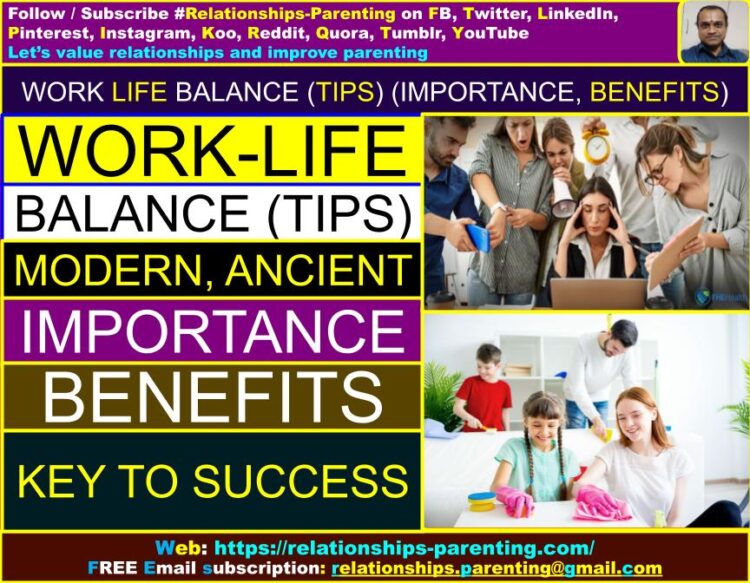
What is life (in reality): ‘Life’ or ‘Reality of Life’ are sudden events in our life that we as human beings do not think about. On the other hand, we want everything according to our needs.
But in reality nothing happens according to our wishes (almost 99.99%). Life will give us various surprises through our life at every step.
It all depends on how we accept all those challenges and face it with the right solutions. No good thing comes for free, we need to earn it.
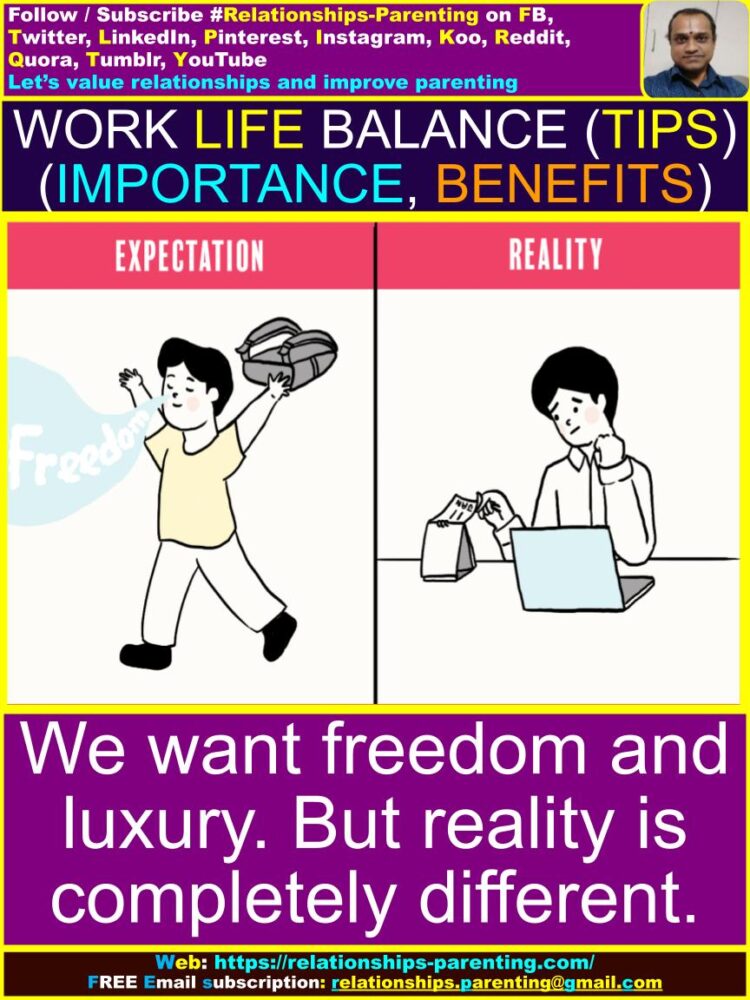
Work-life balance (simple meaning): A healthy work-life balance refers to maintaining a compatible and harmonious relationship between your work and personal life (family, friends, relatives, neighbors, etc.).
This involves consciously managing your money, time and energy to meet professional and personal commitments. On the other hand, you should always prioritize your and your family’s health, self-care and well-being regularly through out your life.
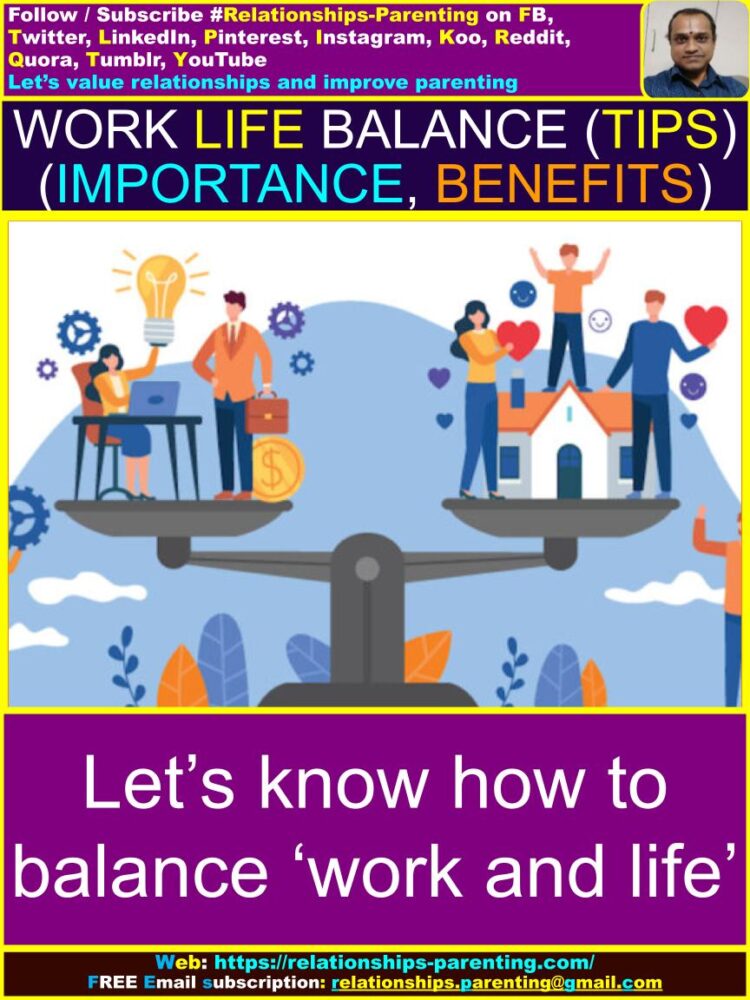
Is work-life balance the key to success? – Achieving a healthy work-life balance is highly important to maintaining the overall well-being and happiness of you and your family. This can have a significant impact on your professional success too.
If you feel your well-being is valued as a working professional, you will thrive and achieve more in both family and work life. Work-life balance ensures that individuals have time for family, personal pursuits and relaxation, promoting physical and mental health.
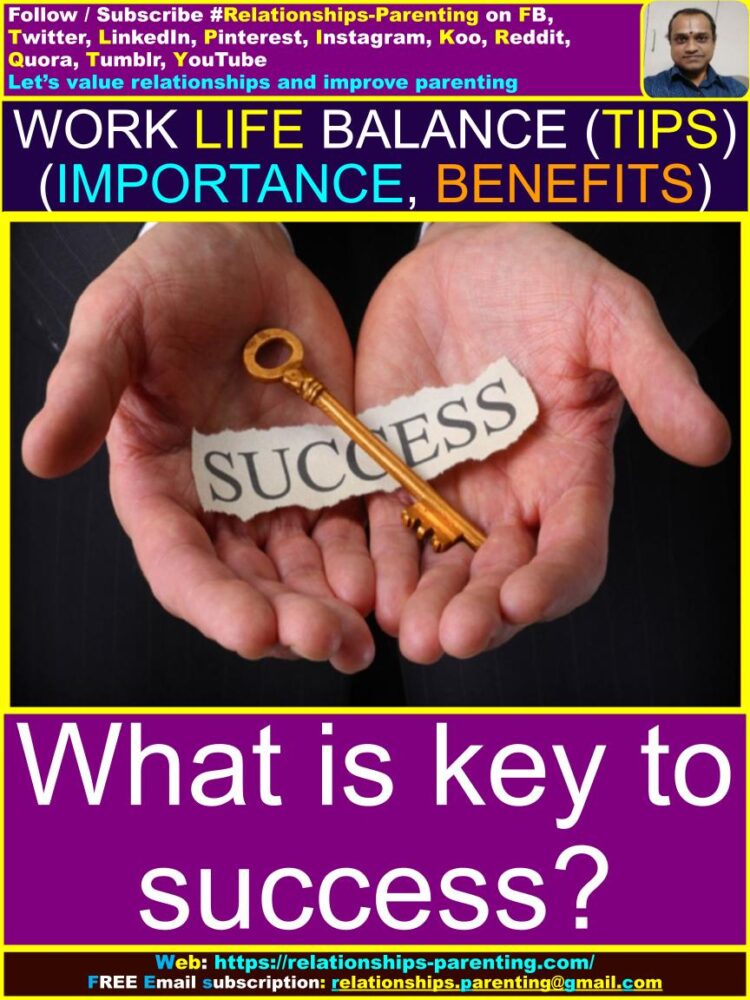
Work-life balance in HRM: Work-life balance is an aspect of employee well-being that relates to an employee’s capability to manage both personal and professional responsibilities with adequate time for rest and leisure.
Understanding how important balance is in creating engaged and happy workers and work lives is important. A healthy work-life balance allows an employee to excel at work and take care of their personal well-being outside the office.
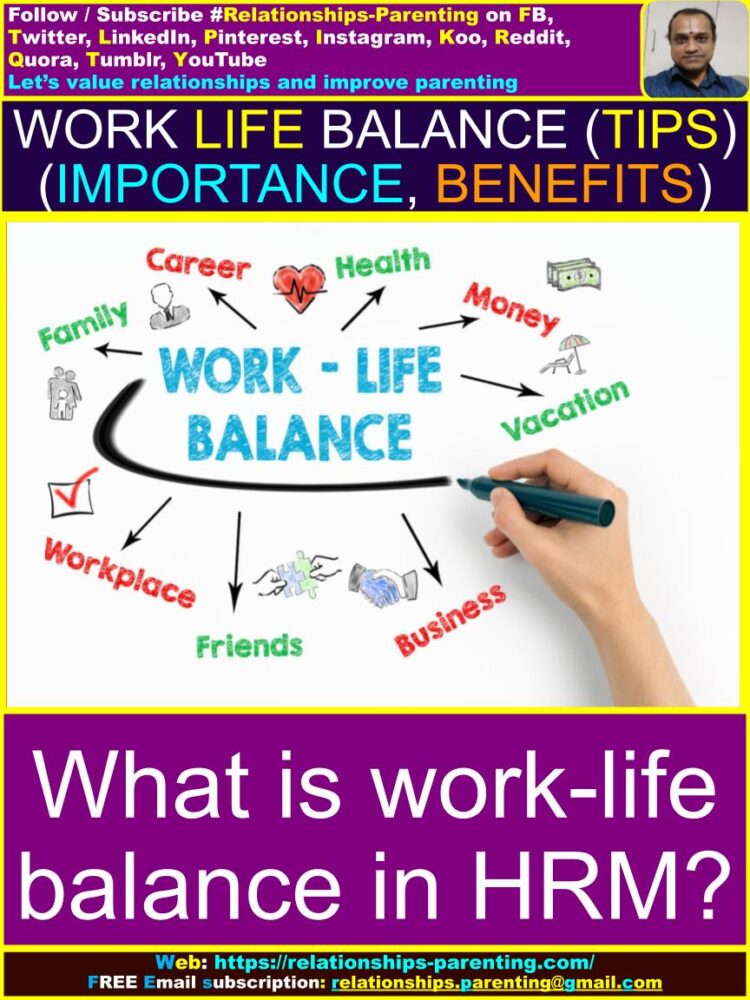
How to manage work-life balance for a woman: First and foremost, as a woman, you are a great and wonderful being on this earth.
As women, you often navigate the challenging terrain of balancing your family responsibilities with your professional aspirations. With the increase of women in the workforce, the pressure to excel in both domains has increased.
Women today need to be effective mothers, wives and caregivers, while also excelling in their careers. It is an enormous task. But with the right and positive mindset, approach and support, it can be achieved easily.
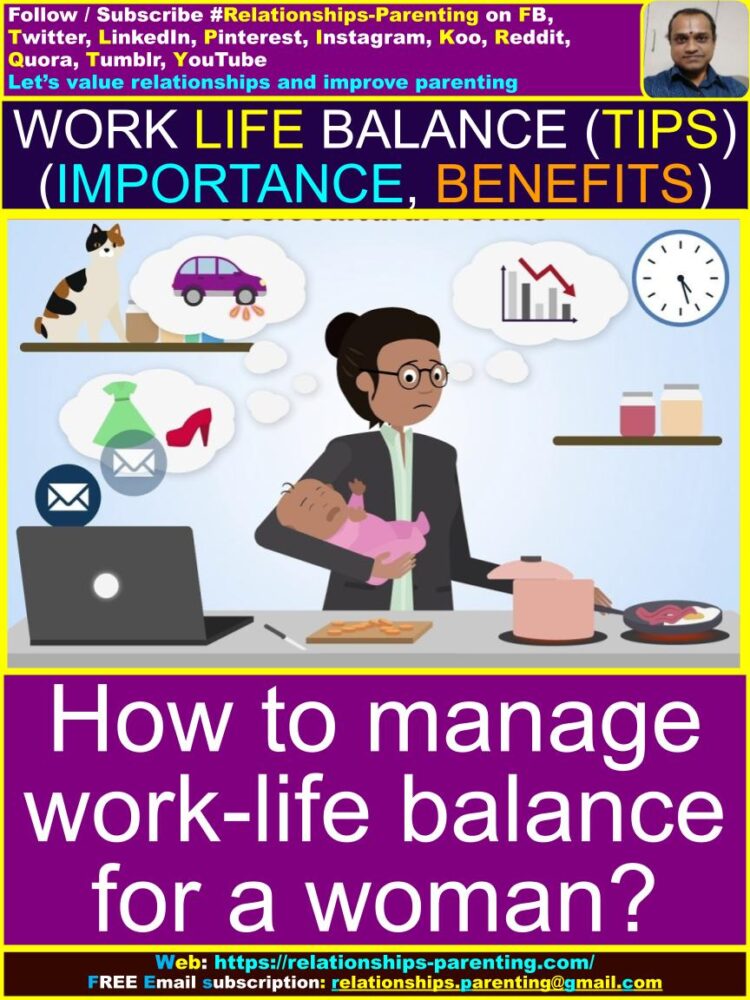
How to manage work-life balance for a man: As a modern working professional (for men), you should give importance to helping your wife (family) at home and also create your own ideas to complete your official work.
It is the best and golden rule of work-life balance for today’s men.
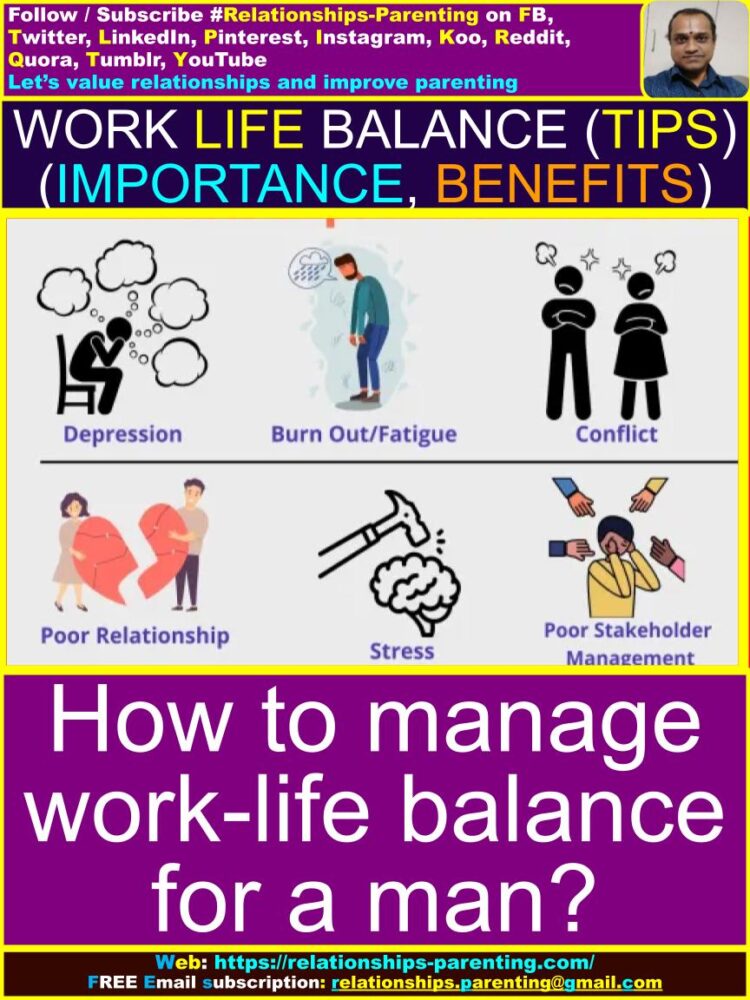
List of about “Work Life Balance (Tips) (Modern & Ancient – Importance, Benefits, problems & solutions) | Work-life balance examples | Work-life balance problems and solutions” is as given below:
Ego is the main setback: We all have an ego. It plays a critical role in creating a sense of stability and continuity in our lives, both personal and professional. Ego allows us to differentiate ourselves from others and mediate between the experience of self and reality.
However, if EGO is left unchecked, it can cause HUGE problems in both personal and workplace. Past experience has shown that the unwanted ego and pride can be responsible for many negative human characteristics (both personal and professional life) including –
Criticizing and judging others, being manipulative, being inflexible and rigid, having an intense mood, and having a constant need for praise and approval.
Feeling superior to everyone around, fear, anxiety, uncooperativeness, taking things too seriously, easily offended, constantly worrying about small things, resentful of others, inability to understand the reality, feelings of despair and hopelessness and need for power and control over others.
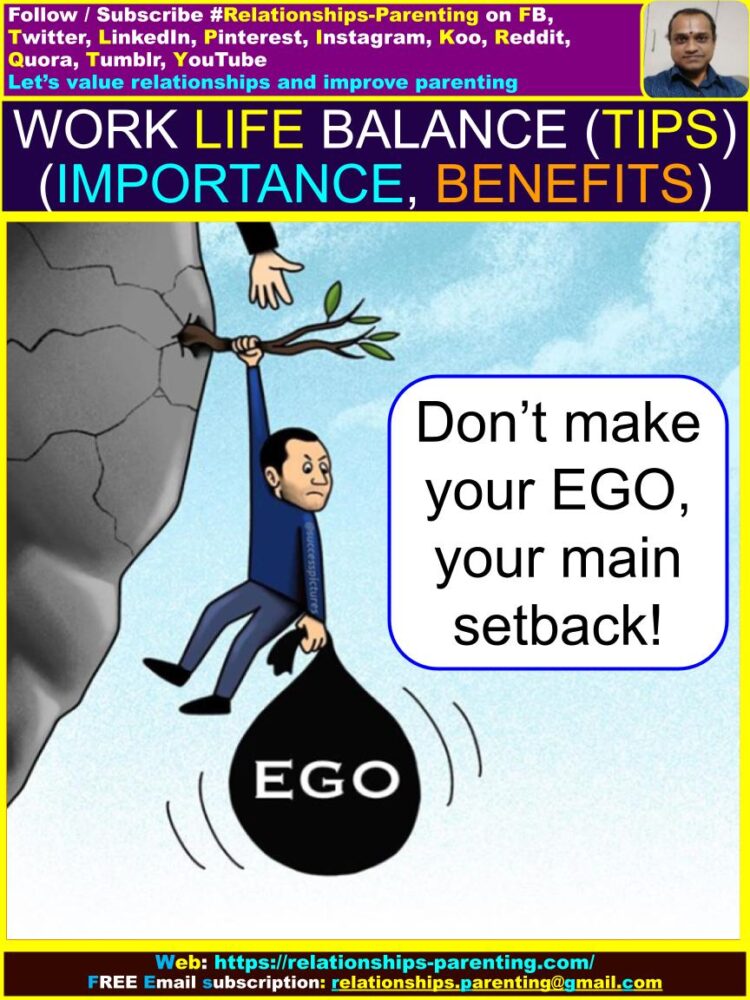
Settle all your old disputes and conflicts: Identifying the sources of stress, tension and dissatisfaction that affect your work and personal life is the first step in managing work-life balance conflicts and disputes.
These can be internal factors such as expecting too much, goals, values and priorities or external factors such as your workload, deadlines, responsibilities and relationships.
By identifying what causes you to feel overwhelmed, frustrated, or unhappy, you can prioritize your needs and set boundaries accordingly. Implement strategies that help you balance your work and personal obligations, goals, and activities.
These strategies may include setting realistic and achievable deadlines, delegating tasks, outsourcing tasks, using technology tools, creating routines, scheduling breaks, pre-planning, and prioritizing your health and well-being.
And always remember that you should monitor your progress, evaluate your results and also celebrate your achievements with your family and colleagues.

Time management is the key: Effective time management can help employers, workers, leaders, entrepreneurs, and small & big business owners achieve their goals. Managing your time wisely improves work-life balance and increases happiness.
Good time management reduces stress and allows you to achieve your goals faster and easier. Overwork and neglect of personal responsibilities can lead to burnout, which negatively affects mental and physical health – not only yours, but of your whole family.
Chronic stress is one of the most common workplace health problems. It can lead to physical symptoms such as diabetes, digestive disorders, chronic pain and heart problems. Along with it can also cause huge mental health issues.
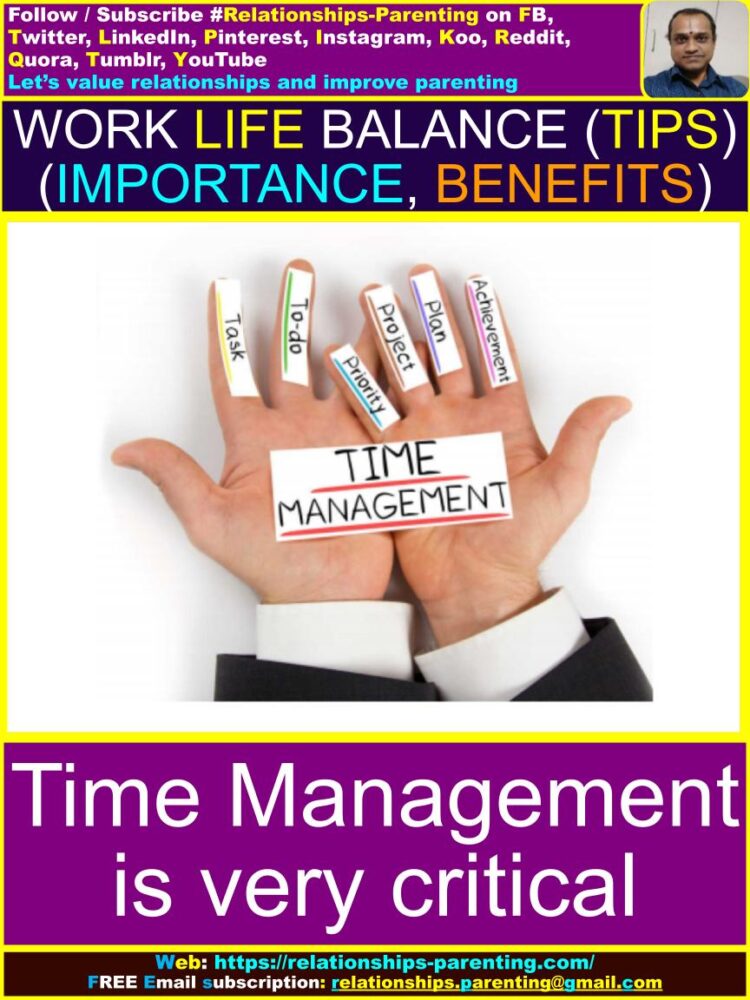
Support your spouse with the household chores: When both partners share the household chores, it creates a more balanced and equal partnership, which helps reduce stress and improves the overall mental health of the partner who is solely responsible for all household chores.
Another benefit for husbands who help with housework is that marital and sexual satisfaction can be improved significantly. Studies have found that a more equal division of household labor can lead to greater marital satisfaction for both partners.
Furthermore, research specifically demonstrated a link between the sharing of housework and increased sexual intimacy in relationships, suggesting that an equal division of household labor increases the quality of couples’ intimate relationships.

Family and selfcare is important: It’s as simple as that, it’s all about balancing your work responsibilities and personal life, including family, friends, hobbies and self-care. Only if you and your family are healthy, you can lead a happy and meaningful life.
A healthy work-life balance improves overall well-being and reduces stress, burnout and other health problems caused by an imbalance between work and personal life.
In addition to the negative impact on health (both physical and mental), a lack of work-life balance can lead to gloomy consequences in other areas of life.
For example, neglecting one’s personal life can strain relationships with family (especially with spouse) and friends and lead to feelings of isolation, loneliness, and unhappiness.

No one is perfect on this earth: Don’t always try to be perfect in your life. No one on earth is 100% perfect. As humans, we make common mistakes day in and day out – not just once, but many times – through out our life.
Don’t strive for a perfect schedule. Strive for a realistic, workable and acceptable schedule. Some days, you may focus more on work, while other days you may have more time and energy to pursue your hobbies or spend time with your loved ones. Balance is achieved over time, not every day.
Many times your family and friends need you (and vice versa). One should spend quality time with them to lead a contented life. An overly hectic and perfect life can lead to huge amounts of stress and affect your family life immensely.
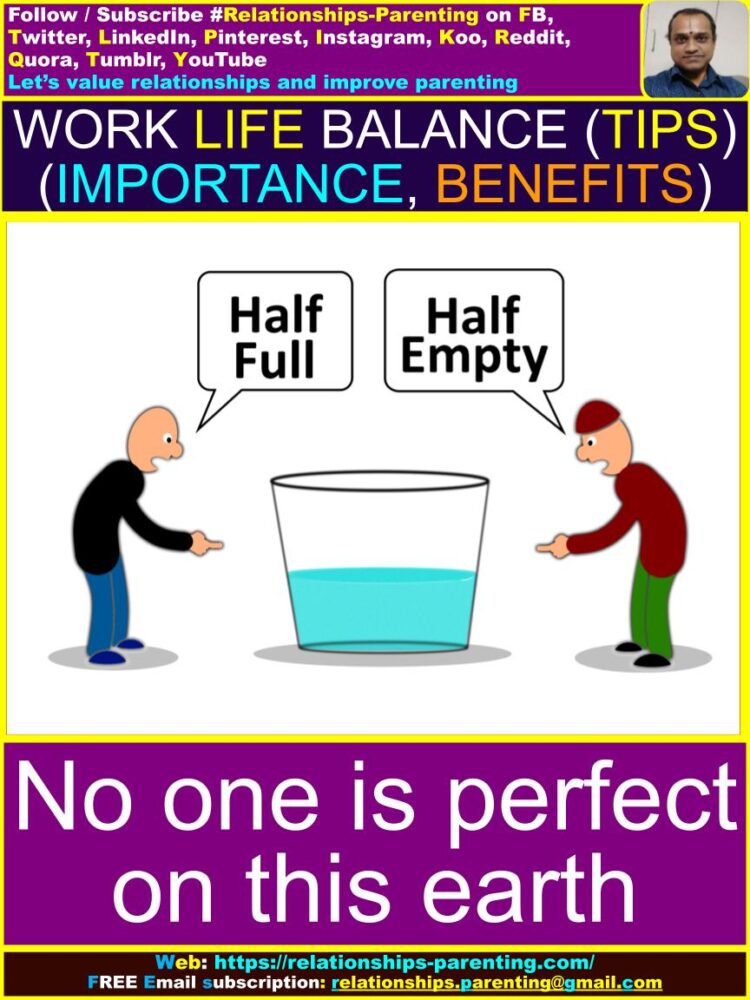
Don’t be afraid to unplug from your work: When you completely disconnect from your workplace for sometime, you can prioritize personal and leisure activities, spend quality time with loved ones, and engage in hobbies and interests that bring you truly contended happiness.
Unplugging and disconnecting from your work allows you to take a deep breath, slow down, and focus on what’s really important. During this time you can gain a new perspective, re-evaluate your priorities and get in touch with your own desires and goals.
This renewed balance translates into greater job satisfaction, increased loyalty, and an overall more positive work environment. Not only this, it also increases your love and care towards your family and friends and of course improves your mental and physical health.
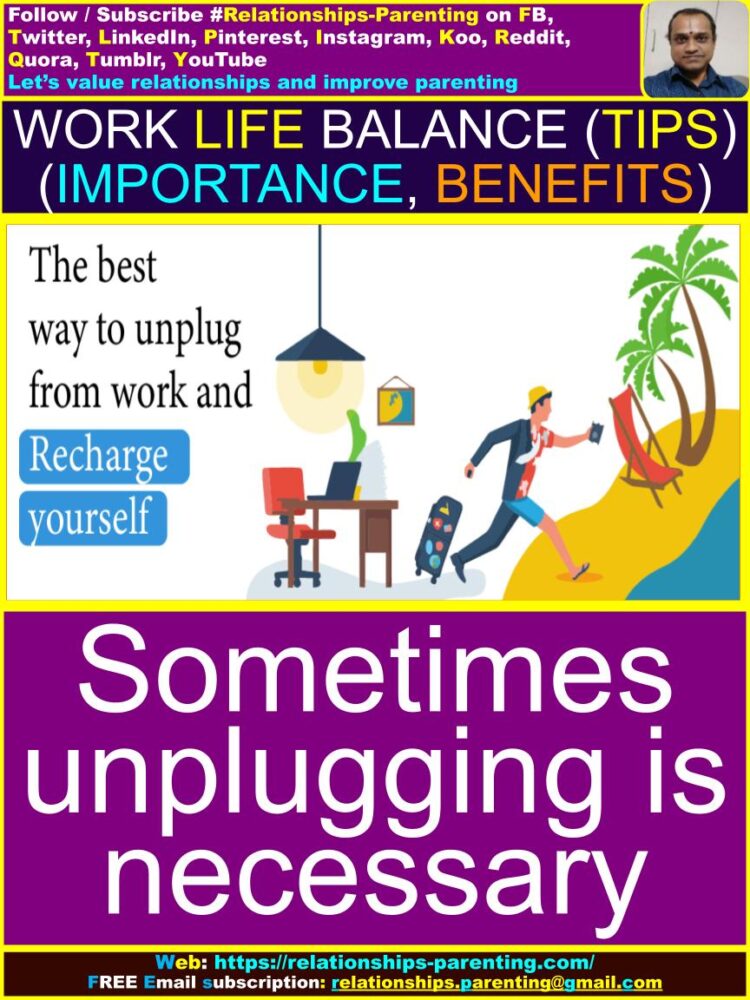
Exercise helps you a lot: Regular physical activity (5 days a week) is one of the most important things you can do for your health to balance your work-life.
Being physically active improves your brain health, helps you manage weight, lowers your risk of disease, strengthens your bones and muscles, and improves your ability to do everyday activities.
Exercise sends loads of oxygen and nutrients to your body and helps your overall system work more efficiently (both physically and mentally). And when your heart and lung health improves, you’ll have more energy to tackle everyday tasks.
As a general goal, aim for at least 30 minutes of moderate physical activity each day (at least 5 days per week). If you want to lose weight, keep off lost weight, or meet specific fitness goals, you may need to exercise more.
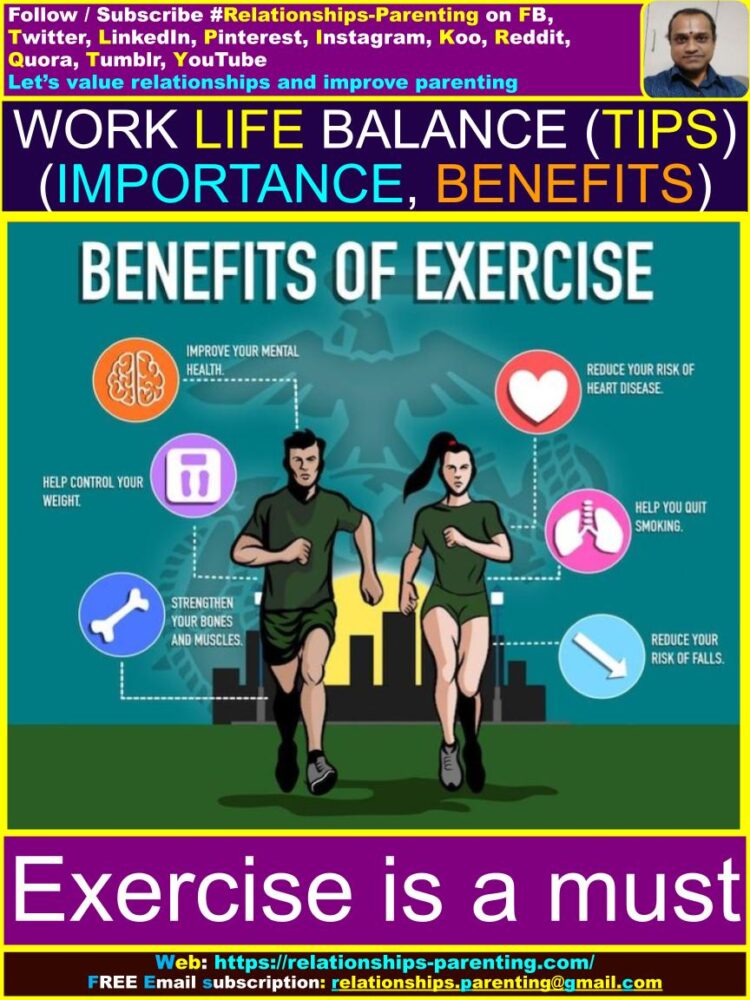
Communication helps you a lot: Good and effective communication in the workplace ensures you have the information you need to perform well, builds a positive work environment and eliminates inefficiency.
Effective communication must convey information accurately while maintaining and improving human relationships. Healthy communication helps ensure everyone is on the same page, same mindset – which can lead to better results.
Frequent and required communication helps family and team members get to know each other’s strengths, weaknesses, work flows, and thought processes.
It helps you learn how to cooperate, talk, listen and empathize with each other (family and work). Limited communication can lead to restricted idea-sharing, less problem-solving and poor performance.
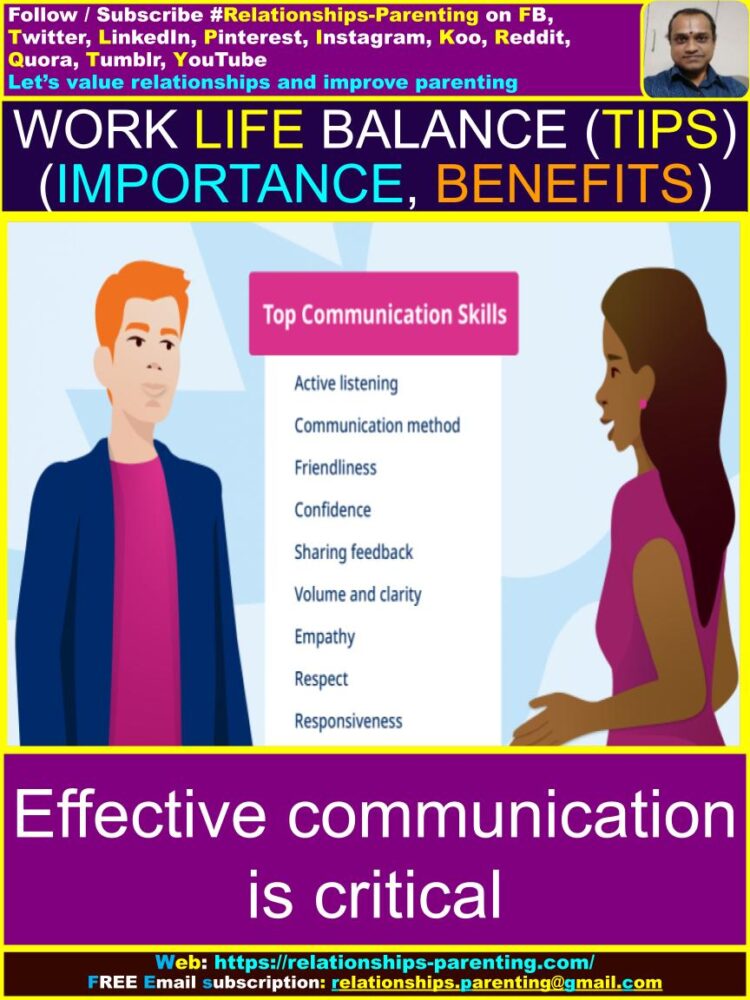
Ask for help when in need: The act of asking for help (both family and workplace) builds stronger connections and relationships. It demonstrates vulnerability, which builds trust and enhances collaboration.
When you are open to receiving help, you create a culture of reciprocity where others seek our support. Once we overcome our fears and embrace the art of asking and listening, we open ourselves to a world of rewards.
We can learn new skills, gain valuable perspectives, and enhance our problem-solving abilities. Asking for help is not disrespectfulness or insulting.
It allows you to tap into the collective knowledge and experiences of those around us, enabling us to tackle challenges more effectively – fast-tracking our careers and improving our overall family life.

Practice care and compassion: Focusing on care and compassion within the family and at work promotes healthy interpersonal relationships. It allows you to willingly accept and appreciate others and work for organizational benefits rather than individual gains.
care, empathy and compassion works by building trust, interpersonal connections, and reciprocity. Compassion helps you connect with others, heal relationships, and move forward while developing emotional intelligence and well-being.
Care and compassion takes empathy a step further because it assumes that all people have a desire to be free from suffering and are filled with a desire to help.
People with healthy compassionate relationships live longer, are healthier, and are less likely to engage in risky behaviors, including drug use, alcoholic consumption etc.

Make donation a regular habit: No matter how much you are able to give, whether as an one-time donation, through regular giving or through fundraising for charity, your donation definitely matters.
Every donation done adds up and helps charities work and make a positive difference. More regularly you give, you are more contented in your life. The more contended you are, more satisfied you are. More satisfied you are, more happier you are.
More happier you are, you can lead a happy and healthy lifestyle – Both in family and also in the workplace. Start from the minimum. Donate as much as possible and do it every now and then. You will surely find a lot of difference in your and your family life.
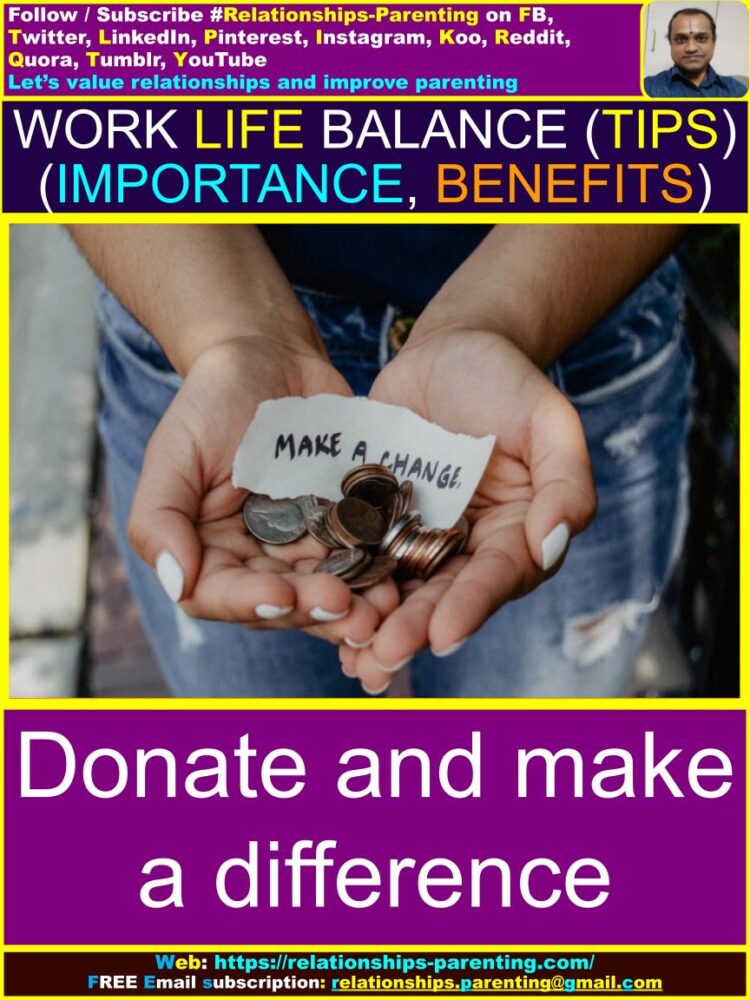
Learn to be social: Past experience shows that positive social connection can lead to longer life, better health and improved well-being in both family and workplace.
Social connectedness is the degree to which people have and perceive the number, quality, and variety of relationships they desire, to feel belonged and cared for, valued, and supported. Having strong positive social relationships is significantly important in terms of health (both physical and mental).
They promote a sense of safety, belonging and security. Allowing yourself to confide in others and allowing others to confide in you is a huge helper of mental health and enhances your bonding with others.

Work from home as much as possible: A balanced lifestyle is essential for all the employees in maintaining good physical and mental health.
When you achieve a healthy work-life balance, you can better manage stress and reduce your risk of developing chronic health conditions such as heart disease, anxiety and depression.
Work from home employees cite better work-life balance as the main reason they work remotely. They have the autonomy to shape their workday so they can be more productive, perform their tasks efficiently, and spend time on activities outside of work.
When employees are balanced and happy, they are more productive, take fewer sick leaves, and are more likely to stay at their jobs for longer period.
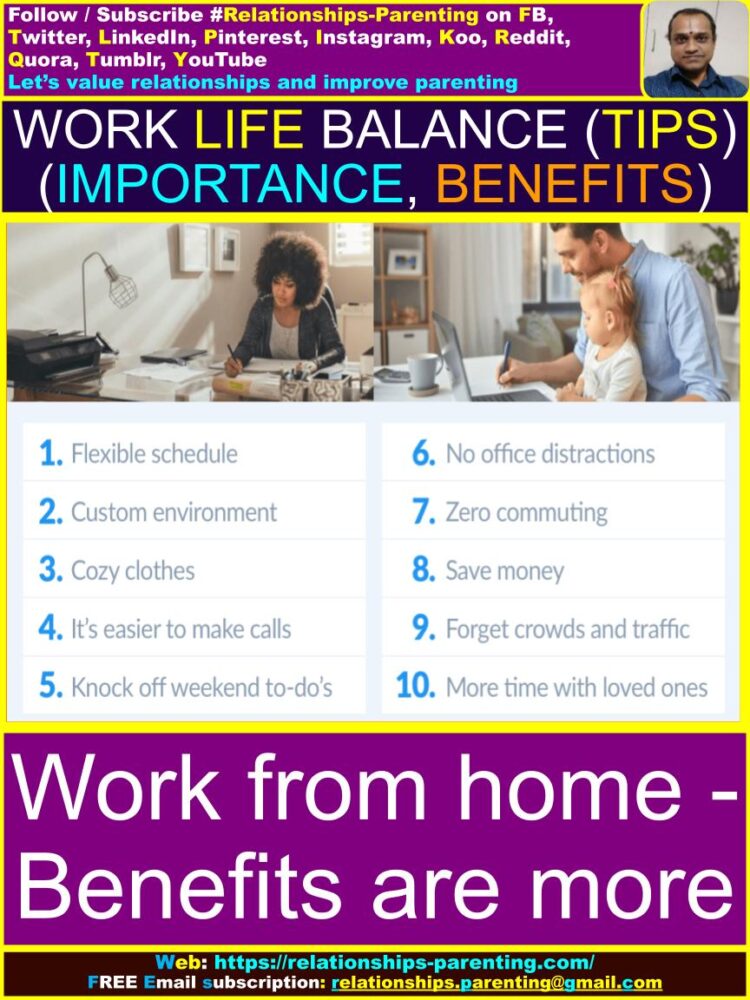
Physical intimacy with your spouse: Hundreds of studies have found that couples who physically touch each other are happier. From backrubs to gentle caresses to holding hands to hugs, the more intimately a couple connects with each other, the more satisfied they are with their relationships.
Being physically together releases mood-boosting endorphins, strengthening the emotional bond between partners. Embracing your partner physically and emotionally through cuddling fosters a sense of closeness and security.
This intimate touch releases oxytocin, creating a nurturing environment where both individuals feel cared for. Obviously, sexual touch is also important, but non-sexual physical contact has unique benefits.
This type of touch encourages connection and relaxation, as well as builds intimacy. More you are satisfied with physical intimacy, you can give more time at your workplace.

Review your finance regularly: Basic money management is about meeting your family’s daily expenses, managing unexpected bills and saving for the future for yourself and your family.
Money management can put you in control of your life to some extent, which can help you feel less stressed and more secure. This allows you to enjoy family life rather than worrying about your finances.
As critical as financial goals are in driving long-term prosperity, they also contribute significantly to reducing financial stress.
The clarity and structure provided by goal-setting can help alleviate financial anxiety by providing a clear guideline for managing personal and family finances. Remember, money is important in your life, but money is not the only thing in your life.

What are the benefits of work-life balance? (Given below):
Increased productivity: Your productivity in both family life and professional life will increase enormously. Better time management: You will start to manage time more convincingly than ever before.
Improved personal physical and mental health, and wellbeing: You will be more healthier both physically and mentally than ever before. Reduction in sickness and absenteeism: You will take less leave compared to earlier days.
A happier and less stressed workforce: You and your team will be able to give more time and thus efficiency will increase exponentially. More valued and engaged staff: You and your staff (colleagues) will start to engage more structurally.
More loyal & committed: You will be more loyal and work more committedly than before. Motivate and energy: You will have more motivation and more energy to work. Boost staff (colleagues) morale: Level of purpose and confidence will improve a lot.
Improved customer service: You will start to give better service to your clients. Improved mental health: You will be more satisfied with your work and workplace. Less stress: If you are happy with your family and workplace, you will be less stressed.
Enjoy life and work: You will start to enjoy family life and work life. Success rate will improve: You will start to taste the sweetness of your success in your life. More time for family: You will spend more time for family and friends.
More time for physical intimacy with your spouse: You can give more time for your spouse intimately. More money: Since your mind is free now, you will start to earn more. More happier: Overall, you will start to enjoy life and will be more happier in your life.
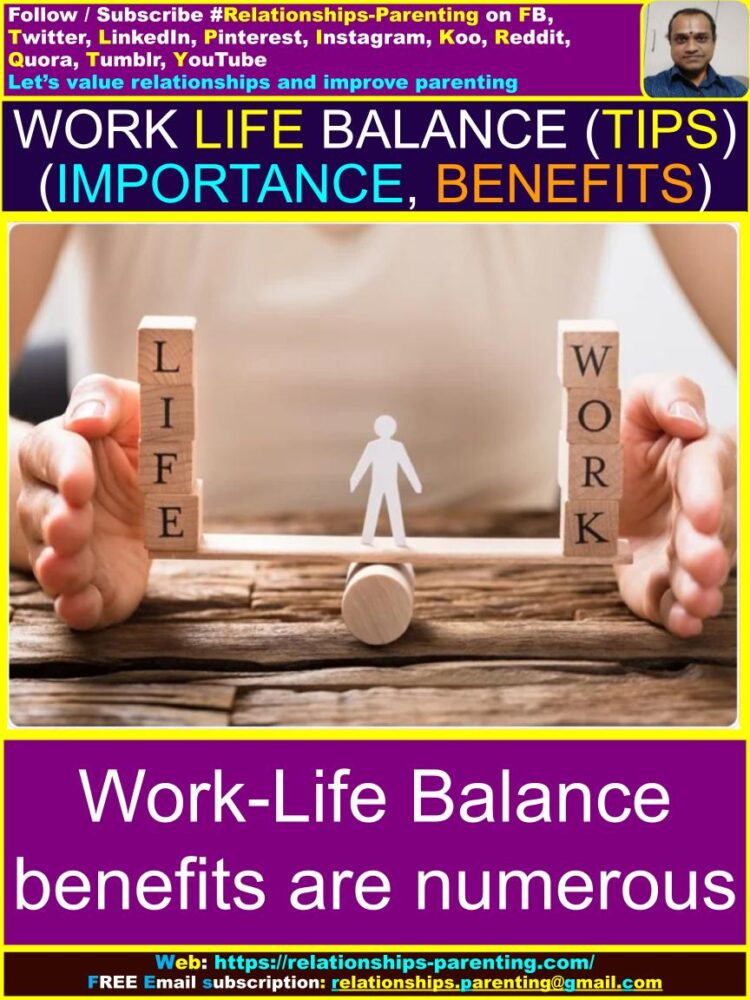
More information will be added to this on regular basis. Please visit this post and blog / website to know more about relationship and parenting.
Continue reading about:
To know more about “Husband and wife information, facts“, please click the below link:
Husband and wife information, facts
Dear friends, if you need any clarifications about this post, kindly let me know, I will definitely try to answer all of them.
Also add your COMMENT below, SHARE on different SOCIAL MEDIA networks.
This will help to know the quality of this content and also it will be helpful to know if any improvements is required for the content.
If you feel this content is useful to you and has helped you to improve your knowledge, kindly share this with your well-wishers.
Because “SHARING MEANS CARING”.
To receive FREE EMAIL SUBSCRIPTION about #Relationship #Parenting, you can send an email to [email protected] from your email ID.
Let you and your well-wishers live a prosperous, healthy and fearless life through out your life term.